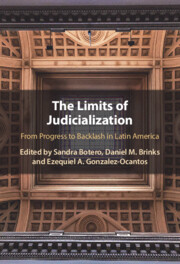Crossref Citations
This Book has been
cited by the following publications. This list is generated based on data provided by Crossref.
Basabe-Serrano, Santiago
2023.
corrupción judicial en América Latina: Ecuador en perspectiva comparada.
Perfiles Latinoamericanos,
Vol. 32,
Issue. 63,
Schedler, Andreas
2023.
Basic Democratic Trust.
SSRN Electronic Journal,
Gamboa, Laura
García‐Holgado, Benjamín
and
González‐Ocantos, Ezequiel
2024.
Courts against backsliding: Lessons from Latin America.
Law & Policy,
Croce, Mariano
and
Tosel, Natascia
2024.
Are Citizens in Court Impairing Representative Politics? On the Politics of Judicial Rights Protection.
Political Studies,
Rivera-Vélez, Luis
2024.
AMLO contre le cannabis : le tout-puissant veto présidentiel à la trajectoire de légalisation du cannabis au Mexique.
Cahiers des Amériques latines,
Vol. 104,
Issue. ,
Taylor, Whitney K.
and
Tarrow, Sidney
2024.
Law, Mobilization, and Social Movements.
Morales Forte, Estuardo Sebastian
2025.
An Entrepreneurial View of Judicial Capture.
Journal of Law and Courts,
p.
1.
Šipulová, Katarína
2025.
The light and the dark side of judicial resistance.
Law & Policy,
Vol. 47,
Issue. 1,
Chabot, Rose
2025.
Storytelling and the campaign for abortion legalization in Argentina: the emblematic cases of Ana María Acevedo and Belén.
International Feminist Journal of Politics,
p.
1.



